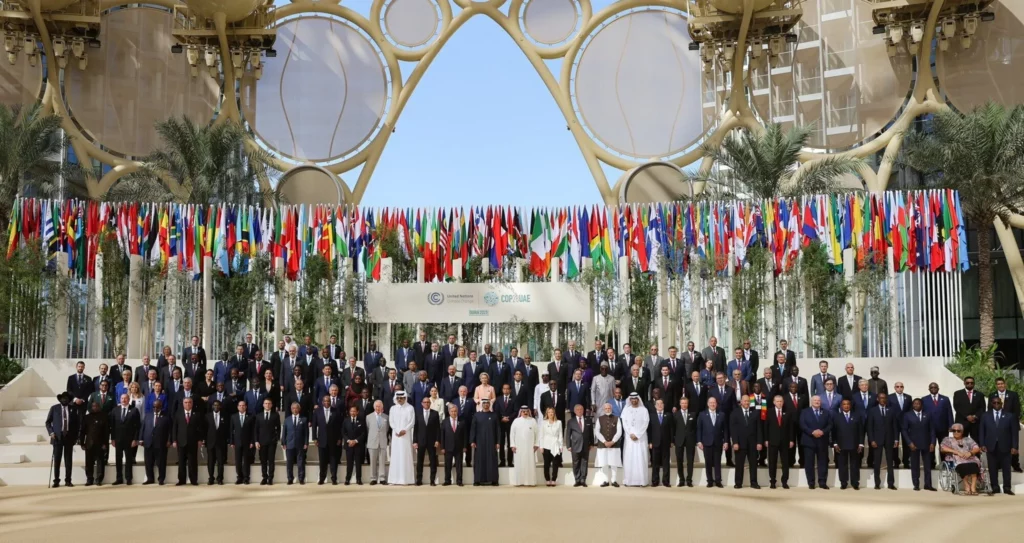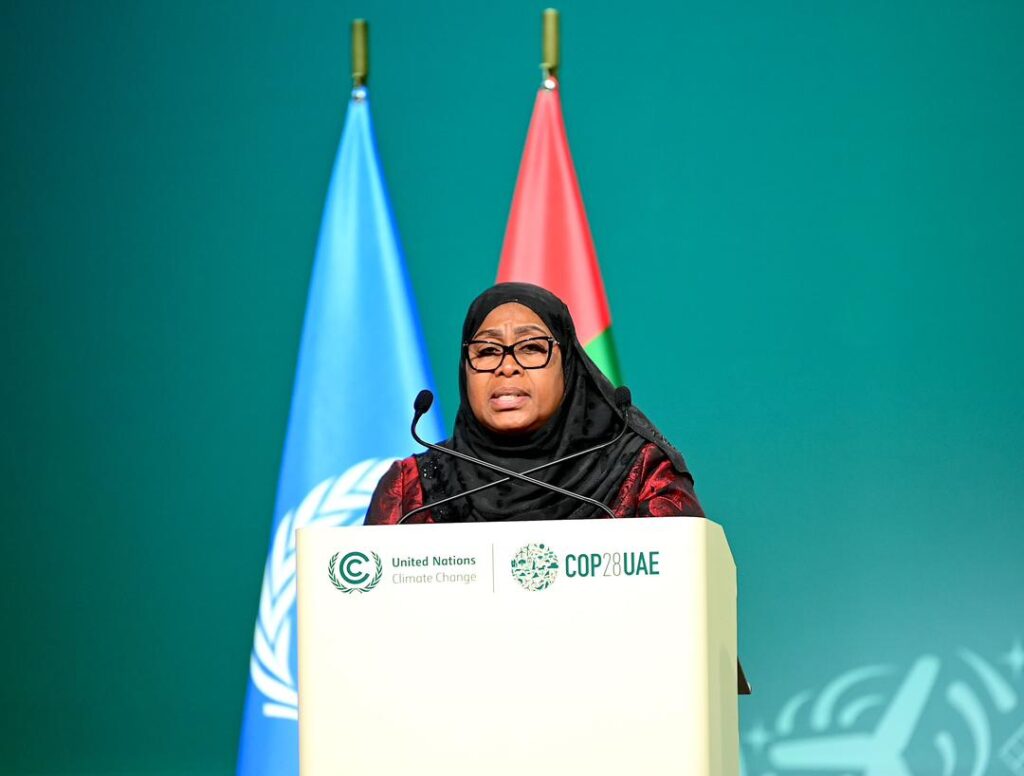By Halili Letea
Dar es Salaam. The President of the United Republic of Tanzania, Samia Suluhu Hassan, has stressed the commitment of developed countries to provide funds for climate financing as agreed.
The pledge to provide funds of 100 billion US dollars (Sh250 trillion) was made at the 15th meeting of the United Nations Framework Convention on Climate Change (UNFCCC-COP15) in 2009.
“In Copenhagen, we committed $100 billion annually for climate action. So far, less than required. It is still not forthcoming. In Paris, we resolve to keep warming below 1.5 degrees Celsius until 2030. However, the current rate of warming is alarming. It must be saved,” said President Samia.
The president states that when addressing COP28 at the World Climate Action Summit, the high-level segment is an ongoing conference in Dubai, United Arab Emirates, where it will be attended by more than 70,000 participants from approximately 190 countries.
“Unfulfilled commitments erode solidarity and trust and have detrimental and costly consequences for developing countries,” she said.
According to her, Tanzania is losing two to three percent of its GDP due to climate change.
President Samia further noted that the IPCC report cautioned that adaptation options that are visible and effective today will become constrained and less effective with increasing global warming, stressing that putting in place the global goal of an adaptation framework is a matter of urgency and not a choice.
“We seek to mobilize support for increased use of clean and affordable cooking fuels and technologies across Africa, especially for women. Our call is for all of us to play our part,” she stressed.
Leadership, cooperation, and political will are needed for action
Speaking before the Secretary General of the United Nations, António Guterres said that to achieve the 1.5-degree target by 2030, the world needs leadership, cooperation, and political will, as the Intergovernmental Panel on Climate Change has charted a clear path to that milestone.
“Earth’s vital signs are failing: record emissions, ferocious fires, deadly droughts, and the hottest year ever. We are miles from the goals of the Paris Agreement—and minutes to midnight for the 1.5-degree limit. But it is not too late,” he said.
He said we have the technology to avoid the worst of climate chaos if we act now. Climate action can flip the switch. Renewable energy is the gift that keeps on giving. It is good for our planet, our health, and our economies. cleaning our air. meeting the world’s growing energy demand. connecting millions of people to affordable electricity.
He then noted that “bringing stability and security to markets and saving money—renewable energy has never been cheaper. The diagnosis is clear. The success of this COP depends on the Global Stocktake prescribing a credible cure in three areas.
The secretary called for the G20, which represents 80 percent of the world’s emissions, to lead. “I urge countries to speed up their net zero timelines to get there as close as possible to 2040 in developed countries and 2050 in emerging economies.”
In another directive, he said we cannot save a burning planet with a firehose of fossil fuels, so we must accelerate a just, equitable transition to renewables.
“The science is clear: The 1.5-degree limit is only possible if we ultimately stop burning all fossil fuels. Not reduce. Not abate. Phaseout—with a clear timeframe aligned with 1.5 degrees,” he adds.
According to him, climate justice is long overdue, and developing countries are being devastated by disasters they did not cause. Extortionate borrowing costs are blocking their climate action plans. And support is far too little, far too late.
Contributing to this, the lecturer at the Center for Climate Change Studies, University of Dar es Salaam, Professor Pius Nyada, noted that what the leaders of the states spoke about reflects the reality of what is going on in the world, and the issue of commitment is important.
He added that “African countries are more affected despite the fact that they do not contribute much to pollution, so developing countries need to be responsible so that the world can reach its goals.”
The loss and damage fund was activated with nearly $400 million in pledges
There is a positive sign for the climate negotiations ongoing at the United Nations Climate Change Conference (COP28) in Dubai after the loss and damage fund was activated with nearly $400 million in pledges.
The Fund was first agreed upon during COP27, held in Sharm El Sheikh, Egypt, and aims to assist developing countries that are particularly vulnerable to the adverse effects of climate change in responding to economic and non-economic loss and damage associated with the adverse effects of climate change, including extreme weather events and slow-onset events.
According to the official COP28 statement made during the first day of the conference on November 30, 2023, the host, the United Arab Emirates (UAE), announced its commitment of $100 million to the Fund, with another notable commitment including Germany, which committed $100 million.
The United Kingdom committed £40 million for the Fund and £20 million for other arrangements; Japan contributed $10 million; and the United States committed $17.5 million.
Reports also reveal that the European Union (EU) also plans to contribute $145 million on top of Germany’s contribution on behalf of the 27-member bloc.
COP28 President Dr. Sultan Al Jaber called on nations to follow the UAE’s example and immediately commit resources to the Fund in an ambitious multilateral act.

“The speed at which the world came together to get this fund operationalized within one year since parties agreed to it in Sharm El Sheikh is unprecedented,” Dr. Al Jaber said.
“This fund will support billions of people, lives, and livelihoods that are particularly vulnerable to the effects of climate change,” he said.
This story was produced with support from MESHA and the IDRC Eastern and Southern Africa office.


